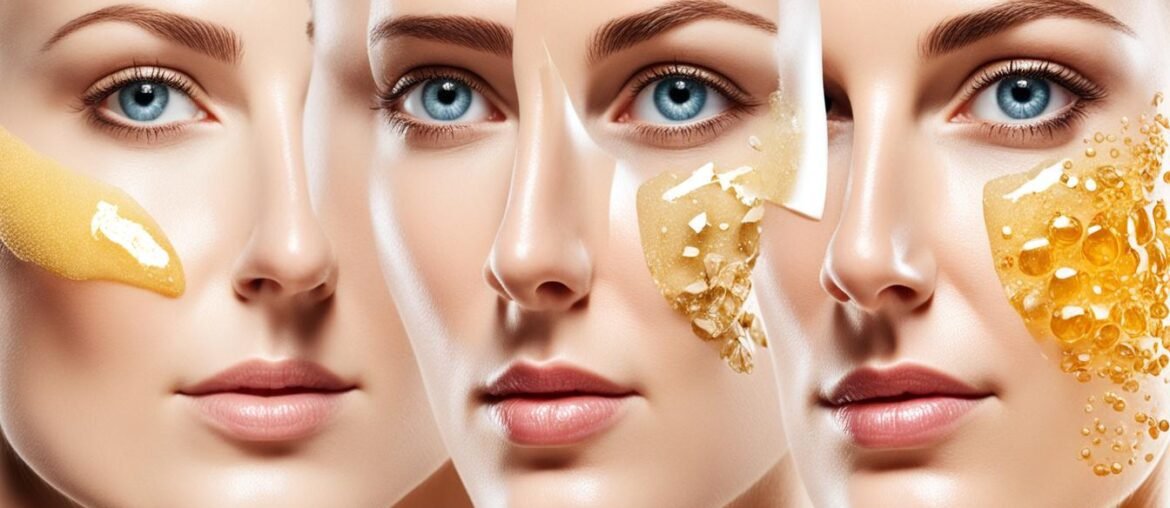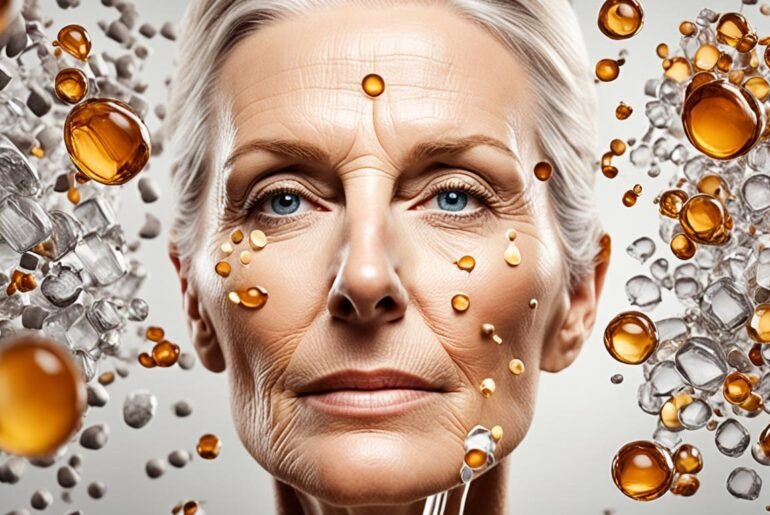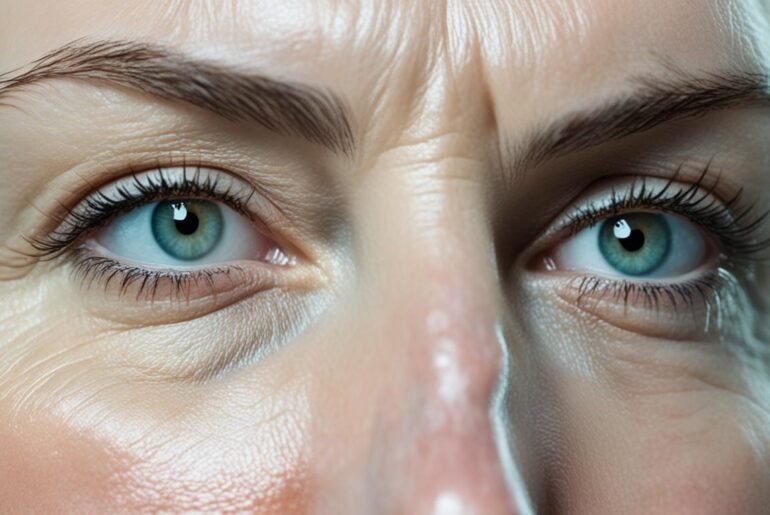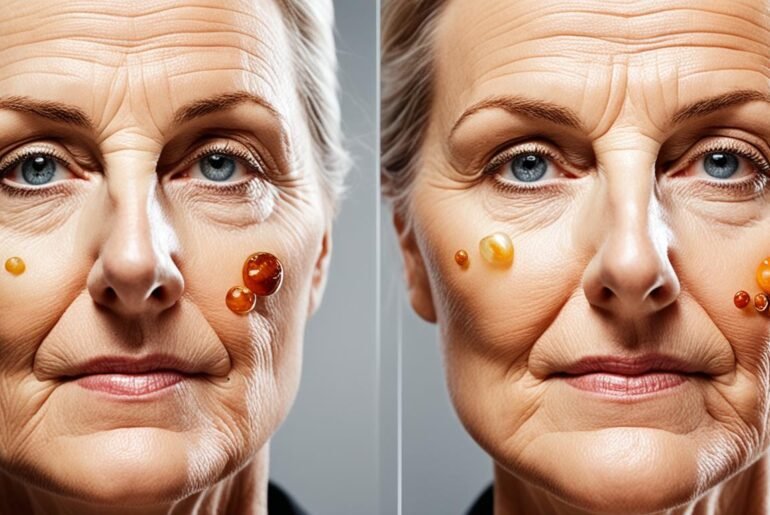Did you know that frequent and excessive drinking can significantly affect your skin’s elasticity and overall health? The impact of alcohol on the skin is far-reaching, causing issues such as reduced elasticity, dryness, and even complications like flushing. With the rise in alcohol consumption, it’s crucial to understand how alcohol, including beer, can influence our skin’s wellbeing and what steps we can take to maintain healthy skin.
Key Takeaways:
- Excessive alcohol consumption can lead to reduced skin elasticity, dryness, and increased risk of skin conditions.
- Beer, when consumed in moderation, may offer potential benefits for the skin due to its ingredients like hops and barley.
- Alcohol can negatively impact collagen production and accelerate collagen degradation, resulting in decreased skin elasticity.
- There is limited scientific evidence supporting the effectiveness of beer-based skincare products, and further research is needed.
- Moderation and responsible alcohol consumption are crucial for maintaining skin health.
The Effects of Alcohol on Skin
Alcohol has several negative effects on the skin, impacting both its health and appearance. Understanding these effects is crucial in maintaining skin wellness and addressing any potential concerns. The impact of alcohol on the skin goes beyond temporary flushing or dryness; it can lead to long-term issues that affect skin health and condition.
Dehydration and Decreased Elasticity
One of the primary effects of alcohol on the skin is dehydration. Alcohol is a diuretic, causing the body to produce more urine and leading to increased water loss. This can result in dry skin, decreased elasticity, and an overall dull complexion.
Flushing and Inflammation
Alcohol consumption stimulates the release of histamines, triggering flushing and inflammation of the skin. This can manifest as redness, swelling, and sensitivity, exacerbating existing skin conditions such as rosacea, psoriasis, seborrheic dermatitis, porphyria cutanea tarda, and discoid eczema.
Sleep Disruption and Aging Signs
Lack of quality sleep due to alcohol consumption can have noticeable effects on the skin. Dark circles under the eyes, paler skin tone, a dull complexion, and increased wrinkles or fine lines may become more apparent. Poor sleep quality interferes with the skin’s natural repair process, hindering its ability to regenerate and rejuvenate.
Increased Risk of Infections and Skin Cancer
Prolonged and excessive alcohol consumption weakens the immune system, compromising the skin’s ability to defend against infections. It can also raise the risk of developing skin cancer. Additionally, alcohol-induced liver diseases like alcoholic liver disease can cause visible changes in the skin, including jaundice and spider veins.
| Effects of Alcohol on Skin | Alcohol and Skin Health | Impact of Alcohol on Skin |
|---|---|---|
| Dehydration | Flushing and Inflammation | Sleep Disruption and Aging Signs |
| Decreased Elasticity | Increased Risk of Infections and Skin Cancer | Alcohol’s Effects on the Liver |
Alcohol and Collagen Production
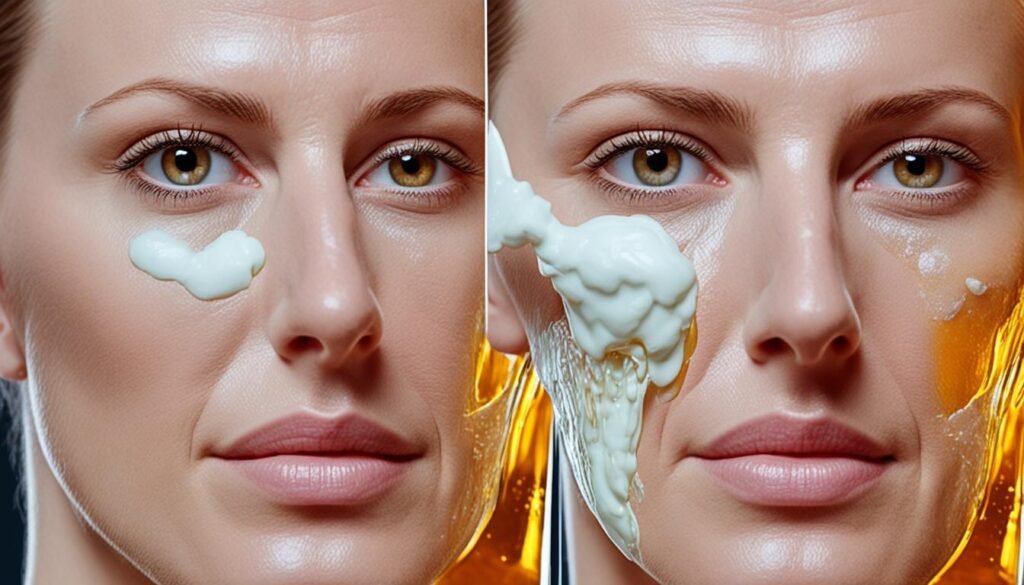
Collagen is a vital protein that plays a crucial role in maintaining the skin’s elasticity and youthful appearance. However, excessive alcohol consumption can have detrimental effects on collagen production and synthesis, leading to a loss of skin elasticity and the formation of wrinkles and fine lines.
When consumed in high quantities, alcohol can inhibit the formation of new collagen in the skin. Additionally, it can accelerate collagen degradation, further compromising skin elasticity. This breakdown of collagen fibers can contribute to the visible signs of aging, such as sagging skin and the development of wrinkles.
Alcohol-induced inflammation and oxidative stress are other factors that can contribute to collagen damage. The inflammatory response triggered by alcohol consumption can interfere with the natural collagen synthesis process, impairing the skin’s ability to repair and rejuvenate itself.
Studies have shown that chronic alcohol consumption can lead to a significant decrease in collagen production in the skin[1].
To fully grasp the impact of alcohol on collagen production and skin elasticity, further research is needed. However, it is clear that excessive alcohol consumption disrupts the natural balance of collagen in the skin, impairing its ability to maintain firmness and elasticity.
Alcohol’s Effects on Collagen Synthesis
Alcohol not only affects collagen production but also interferes with collagen synthesis. Collagen synthesis involves the conversion of procollagen, a precursor molecule, into mature collagen fibers. This process is crucial for maintaining skin elasticity and suppleness.
Alcohol consumption disrupts the delicate balance of collagen synthesis by inhibiting the enzymes involved in the conversion of procollagen into collagen. This inhibition results in the accumulation of immature collagen fibers and the impaired production of mature collagen[2].
Chronic alcohol consumption has been shown to reduce collagen synthesis and decrease the levels of mature collagen in the skin[3].
Furthermore, alcohol-induced oxidative stress can lead to the production of harmful free radicals, which can damage collagen fibers and impede the skin’s natural repair mechanisms.
Alcohol and Collagen Degradation
In addition to inhibiting collagen production and synthesis, alcohol consumption can accelerate collagen degradation. Collagen degradation is a natural process that occurs as part of the skin’s turnover and renewal process. However, alcohol can disrupt this process, leading to a faster breakdown of collagen fibers and a decline in skin elasticity.
Alcohol-induced inflammation and oxidative stress play a significant role in collagen degradation. The inflammatory response triggered by alcohol consumption can upregulate enzymes known as matrix metalloproteinases (MMPs), which degrade collagen fibers. Furthermore, the production of free radicals due to alcohol-induced oxidative stress can directly damage collagen molecules, making them more susceptible to degradation[4].
Research has revealed that chronic alcohol consumption can result in increased collagen degradation and a decrease in the skin’s collagen content[5].
To protect and maintain collagen production and skin elasticity, it is crucial to limit alcohol consumption and adopt a healthy lifestyle that includes a balanced diet, regular exercise, and adequate hydration.
References:
- Alcohol-induced oxidative stress and cell injury in liver and other organs. Retrieved from https://pubmed.ncbi.nlm.nih.gov/10515492/
- Impact of alcohol consumption on biological aging: from biochemical mechanisms to cellular processes and beyond. Retrieved from https://pubmed.ncbi.nlm.nih.gov/32515492/
- Effect of alcohol consumption on skin aging and wrinkle formation: Results from a nationwide survey. Retrieved from https://pubmed.ncbi.nlm.nih.gov/31474501/
- Molecular Pathways Involved in Alcohol-Induced Collagen Overproduction in Human and Mouse Skin Fibroblasts. Retrieved from https://pubmed.ncbi.nlm.nih.gov/25902523/
- Collagen metabolism in alcoholic liver disease. Retrieved from https://pubmed.ncbi.nlm.nih.gov/22284787/
Beer and Skin Health
While excessive alcohol consumption can have detrimental effects on the skin, beer, when consumed in moderation, may have some potential benefits for skin health. Beer contains various ingredients that could promote healthy skin, including B vitamins, minerals, and antioxidants.
Vitamins: B vitamins, such as niacin, riboflavin, and pantothenic acid, are found in beer and play a crucial role in maintaining skin health. These vitamins contribute to skin firmness, hydration, and radiance.
Minerals: Beer also contains essential minerals, such as zinc, selenium, and magnesium, which are important for maintaining proper skin function. These minerals support skin elasticity and help protect the skin against environmental damage.
Antioxidants: Polyphenols, a type of antioxidant found in beer, can help reduce inflammation in the skin. These compounds have anti-inflammatory properties that may alleviate skin conditions like acne and eczema. Hops, one of the main ingredients in beer production, are particularly rich in these beneficial polyphenols.
However, it’s crucial to note that the potential benefits of beer for the skin should be balanced with its potential risks when consumed excessively. Moderation is key to enjoying the potential positive effects of beer on skin health.
| Benefits of Beer for Skin | Beer’s Effects on Skin | Beer and Skin Rejuvenation | Beer for Youthful Skin |
|---|---|---|---|
| Promotes skin firmness | Contains vitamins and minerals | Hops have anti-inflammatory properties | Supports skin hydration |
| Improves skin radiance | Rich in antioxidants | Alleviates skin conditions like acne and eczema | Protects against environmental damage |
| Nourishes the skin | Supports proper skin function |
Beer and Collagen Production
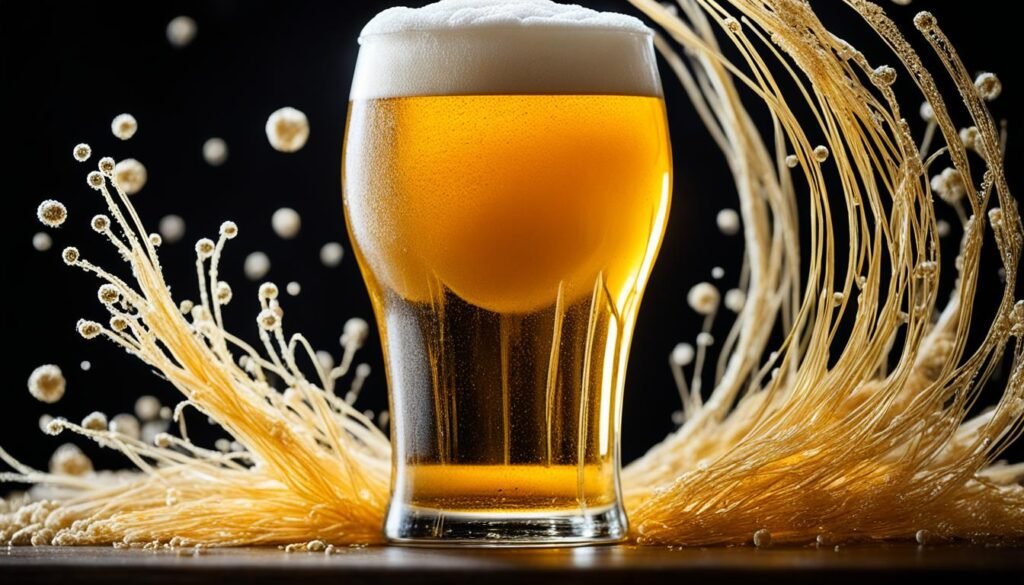
Beer, with its unique ingredients such as hops and barley, has been the subject of studies exploring its potential impact on collagen production in the skin.
The compounds found in these beer ingredients have shown promising results in stimulating the synthesis of collagen in skin cells. Collagen is a vital protein responsible for maintaining the skin’s elasticity and youthful appearance. By promoting collagen production, beer may contribute to improved skin elasticity and reduced signs of aging.
Furthermore, beer contains antioxidants that can help protect collagen from oxidative stress, which can damage the protein and contribute to the loss of skin elasticity.
While these preliminary studies suggest a positive correlation between beer and collagen production, further research is needed to fully understand the specific effects of beer on collagen synthesis and its overall impact on skin elasticity and anti-aging.
Beer Skincare Benefits
In recent years, the skincare industry has discovered the potential benefits of incorporating beer into various skincare products and treatments. These beer-based skincare products claim to offer a range of benefits for the skin, including improved hydration, reduced inflammation, and enhanced overall appearance. By leveraging the potential antioxidant and anti-inflammatory properties of beer ingredients, these products aim to rejuvenate and nourish the skin.
Beer contains a variety of natural ingredients, such as hops and barley, which are rich in vitamins, minerals, and antioxidants. These components are believed to have positive effects on the skin. For example, the B vitamins found in beer contribute to skin health by promoting cell turnover and improving skin tone. Additionally, the polyphenols in beer act as antioxidants, helping to protect the skin from environmental damage and reducing signs of aging.
Beer treatments for the skin are gaining popularity due to their potential benefits. Some skincare professionals use beer as a natural toner or facial cleanser, claiming that it can help balance the skin’s pH levels and remove impurities. Others incorporate beer into face masks or bath soaks to provide hydration and soothing effects.
However, it’s important to note that scientific evidence supporting the effectiveness of beer-based skincare products is currently limited. While the natural ingredients in beer may have potential benefits for the skin, further research is needed to validate these claims and determine the actual extent of their effects. It’s always advisable to consult with a dermatologist or skincare professional before incorporating any new products or treatments into your skincare routine.
Healthy Alcohol Consumption Guidelines
To maintain skin health and minimize potential negative effects on overall well-being, it is crucial to adhere to responsible drinking guidelines. The National Institute on Alcohol Abuse and Alcoholism provides recommendations for moderate alcohol consumption:
- For females: Up to 1 drink per day
- For males: Up to 2 drinks per day
It is important to note that heavy drinking, defined as consuming more than 3 drinks per day for females and more than 4 drinks per day for males, can increase the risk of developing alcohol use disorder. Prioritizing moderation and avoiding excessive alcohol consumption is essential for maintaining healthy skin.
Treating Skin Conditions Related to Alcohol Use
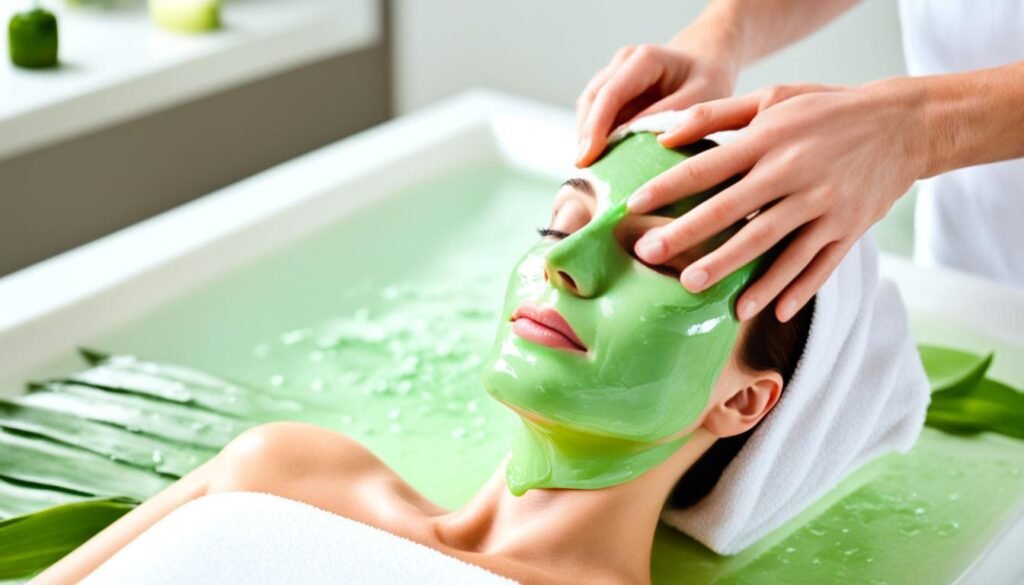
When it comes to treating skin conditions related to alcohol use, it’s crucial to address both the alcohol use disorder (AUD) and any underlying skin issues. By targeting the root of the problem and implementing proper treatment strategies, individuals can manage and improve their skin health.
The treatment options for AUD are varied and depend on the individual’s specific needs. Here are some common approaches:
- Cognitive-behavioral therapy (CBT): This therapy aims to identify and modify unhealthy thoughts and behaviors related to alcohol consumption. It helps individuals develop healthier coping mechanisms and skills to resist alcohol cravings.
- Detox: Detoxification can help individuals safely withdraw from alcohol under medical supervision. It may involve the use of medications to manage withdrawal symptoms and ensure a smoother transition to sobriety.
- Inpatient or outpatient rehabilitation: Rehabilitation programs provide structured and supportive environments for individuals to overcome AUD. Inpatient programs offer 24/7 care and supervision, while outpatient programs allow individuals to receive treatment while living at home.
- Peer support groups: Engaging in support groups such as Alcoholics Anonymous (AA) can provide individuals with a sense of community and encouragement during their recovery journey.
- Medications: There are FDA-approved medications available to help individuals reduce alcohol cravings and maintain abstinence. These medications can be prescribed by healthcare professionals based on individual needs and preferences.
Quitting alcohol and managing alcohol intake play a crucial role in preventing and improving skin conditions caused by alcohol consumption. However, additional treatments may be necessary depending on the specific skin condition. Over-the-counter creams or prescribed medications can help alleviate symptoms and promote skin healing.
Consulting a doctor or dermatologist is recommended to determine the best treatment approach for individual cases. They can provide personalized guidance and recommend appropriate skincare regimens to support the healing process.
Overview of Skin Condition Treatments
| Skin Condition | Treatment Options |
|---|---|
| Rosacea | Topical creams, oral medications, laser therapy |
| Psoriasis | Topical corticosteroids, phototherapy, systemic medications |
| Seborrheic Dermatitis | Topical antifungals, corticosteroids, medicated shampoos |
| Porphyria Cutanea Tarda | Phlebotomy, low-dose hydroxychloroquine, sun protection |
| Discoid Eczema | Topical corticosteroids, emollients, wet dressings |
By addressing both the alcohol use disorder and individual skin conditions, individuals can take an active role in managing and improving their skin health. Seeking professional guidance and adhering to recommended treatment options are essential steps in the journey toward healthier skin.
Tips for Maintaining Healthy Skin

In addition to moderating alcohol consumption, there are various skincare practices that can help maintain healthy and youthful-looking skin.
- Stay hydrated: Drinking an adequate amount of water throughout the day helps keep your skin hydrated and moisturized, reducing the risk of dryness and dullness.
- Use sunscreen: Protecting your skin from harmful UV rays is essential for maintaining its health and preventing premature aging. Apply a broad-spectrum sunscreen with at least SPF 30 every day, even during cloudy or winter days.
- Practice good hygiene: Washing your face twice a day with a gentle cleanser removes dirt, oil, and impurities that can clog pores and lead to breakouts. Avoid using harsh soaps or scrubbing too vigorously, as these can irritate the skin.
- Eat a balanced diet: Consuming a nutritious diet rich in fruits, vegetables, whole grains, and lean proteins provides essential vitamins and minerals that promote skin health. Antioxidant-rich foods, like berries and leafy greens, help fight free radicals and protect against skin damage.
- Get enough sleep: A good night’s sleep allows your skin to repair and regenerate, promoting a healthy complexion. Aim for 7-9 hours of quality sleep each night.
- Manage stress levels: Chronic stress can take a toll on your skin, leading to breakouts and inflammation. Practice stress-management techniques, such as exercise, meditation, or relaxation exercises, to keep stress levels in check.
- Avoid smoking and excessive alcohol consumption: Smoking and excessive alcohol consumption can have detrimental effects on your skin’s health, leading to premature aging, dryness, and increased risk of skin conditions.
Establishing a skincare routine that includes gentle cleansing, moisturizing, and regular exfoliation is crucial for maintaining the overall health of your skin. Exfoliating helps remove dead skin cells and promotes cell turnover, resulting in a smoother and more radiant complexion. Choose skincare products suitable for your skin type and concerns, and be consistent in your routine to achieve the best results.
Remember, healthy skin is a result of both internal and external care. By adopting these skincare practices and making lifestyle choices that prioritize your overall well-being, you can maintain healthy, youthful-looking skin.
Conclusion
Excessive alcohol consumption can have a detrimental impact on the skin, leading to reduced elasticity, dryness, and an increased risk of skin conditions and infections. However, when consumed in moderation and in combination with responsible alcohol consumption, beer may offer some potential benefits for the skin.
Beer contains ingredients such as hops and barley, which have been shown to have positive effects on collagen production. Collagen is essential for maintaining skin elasticity and preventing the formation of wrinkles and fine lines. While research on the specific effects of beer on skin elasticity and anti-aging is still ongoing, these findings suggest that moderate beer consumption may have some skincare benefits.
It’s important to note that maintaining overall skin health involves more than just consuming beer. Following healthy alcohol consumption guidelines, such as limiting consumption to one drink per day for women and two drinks per day for men, is crucial for minimizing the potential negative effects of alcohol on the skin.
In addition, it’s essential to seek treatment for any alcohol-related skin conditions and maintain a comprehensive skincare routine. Prioritizing actions such as staying hydrated, using sunscreen, practicing good hygiene, eating a balanced diet, getting enough sleep, managing stress levels, and avoiding smoking can all contribute to maintaining healthy and youthful-looking skin.
FAQ
What are the effects of alcohol on the skin?
Excessive alcohol consumption can lead to reduced skin elasticity, dryness, flushing, and increased risk of skin conditions and infections. It can also worsen underlying skin conditions and cause complications like rosacea, psoriasis, and seborrheic dermatitis.
How does alcohol impact collagen production?
Alcohol can inhibit the formation of new collagen and accelerate collagen degradation, leading to decreased skin elasticity. It can also cause inflammation and oxidative stress, further damaging collagen in the skin.
Are there any benefits of beer on skin health?
When consumed in moderation, beer may have some potential benefits for the skin. The ingredients in beer, such as vitamins, minerals, and antioxidants, could promote skin firmness, hydration, and radiance. The hops used in beer production also have anti-inflammatory properties that may help alleviate skin conditions like acne and eczema.
Does beer improve collagen production?
Some studies suggest that certain components in beer, such as hops and barley, may have a positive impact on collagen production. These ingredients contain compounds that have been shown to stimulate collagen synthesis in skin cells. However, more research is needed to fully understand the effects of beer on collagen production and skin elasticity.
Are there any skincare benefits of using beer?
Beer-based skincare products claim to offer benefits such as improved hydration, reduced inflammation, and enhanced overall skin appearance. The antioxidants and anti-inflammatory properties of beer ingredients are often leveraged in these products. However, scientific evidence supporting their effectiveness is limited, and further research is needed to validate their claims.
What are the healthy alcohol consumption guidelines?
The National Institute on Alcohol Abuse and Alcoholism recommends that females consume up to 1 drink per day and males consume up to 2 drinks per day. Heavy drinking, which increases the risk of developing alcohol use disorder, is defined as more than 3 drinks per day for females and more than 4 drinks per day for males.
Treatment involves addressing both the alcohol use disorder (AUD) and any underlying skin conditions. Options for treating AUD include therapy, detox, rehabilitation, support groups, and medications. Quitting alcohol and managing intake are important steps to prevent and improve alcohol-related skin conditions. Additional treatments such as creams or medications may be necessary depending on the specific skin condition.
What are some tips for maintaining healthy skin?
To maintain healthy skin, it’s important to stay hydrated, use sunscreen, practice good hygiene, eat a balanced diet, get enough sleep, manage stress levels, avoid smoking, and limit alcohol consumption. Establishing a skincare routine that includes gentle cleansing, moisturizing, and regular exfoliation is also crucial.

